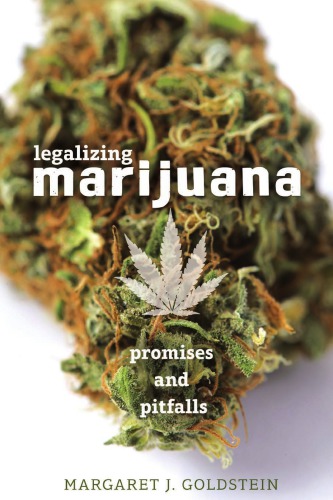
Legalizing Marijuana
Promises and Pitfalls
فرمت کتاب
ebook
تاریخ انتشار
2016
Lexile Score
1310
Reading Level
8-11
ATOS
9.1
Interest Level
4-8(MG)
نویسنده
Margaret J. Goldsteinشابک
9781512411447
کتاب های مرتبط
- اطلاعات
- نقد و بررسی
- دیدگاه کاربران
نقد و بررسی

August 1, 2016
Gr 9 Up-This book outlines the history of marijuana cultivation and use, describes current attitudes toward marijuana, and details the movement toward legalization. While this is a worthwhile resource for students researching controversial issues, the text does tend to promote only one side of the issue (the legal use of marijuana for medicinal and recreational purposes as well as the cultivation of related hemp materials). The "pitfalls" alluded to in the title are mostly frustrations with the slow pace of legalization rather than arguments against legalization. Much of the evidence provided here is anecdotal, with some historical, political, and empirical evidence. Goldstein notes the lack of scientific and thorough studies as one of the frustrations facing the pro-marijuana movement, though it is unclear if additional studies would support legalization. There are some instances where the text seems contradictory. For example, the majority of the work emphasizes the minimal dangers of marijuana use, whereas the "Proceed with Caution" chapter notes the possible permanent neurological damage in younger users. Still, the research is rigorous, complete, and an effective defense of the book's thesis. VERDICT Used in conjunction with other resources, this will be a useful addition for high school research collections.-Paige Rowse, Needham High School, MA
Copyright 2016 School Library Journal, LLC Used with permission.

A well-tempered examination of the current standing of marijuana in the United States, with important forays into its medicinal use.Marijuana didn't just burst on to the scene in the last century, writes Goldstein in this sanely balanced overview of the drug's influence over the centuries. The Chinese were busy experimenting with the herb's healing powers 5,000 years ago, and experimentation went on right up through the American Medical Association's opposition to the 1937 Marijuana Tax Act, citing the plant's "medicinal value." Goldstein doesn't shy away from the ideologically bigoted and racist agendas behind restrictions: "Many Anglo-Americans made associations between marijuana use, racial minorities, jazz music, and amoral behavior." She makes her way through the mare's-nest of federal and state laws and how they have worked counterproductively to provide access for people seeking medical marijuana (which is often low on the buzz component, THC, and high on CBD, marijuana's primary medicinal component). Goldstein also draws a telling parallel between Prohibition and the rise of violent gang-related alcohol crimes and the horrifying cartel-controlled trade in marijuana that the war on drugs has only exacerbated. Hers is the eye of a science journalist, and she writes with levelheaded clarity. Almost any substance can be abused; Goldstein convincingly argues that the illegalization of marijuana is increasingly looking like what happened to the baby in the bathwater. (Nonfiction. 10-16) COPYRIGHT(1) Kirkus Reviews, ALL RIGHTS RESERVED.

Starred review from August 15, 2016
A well-tempered examination of the current standing of marijuana in the United States, with important forays into its medicinal use.Marijuana didnt just burst on to the scene in the last century, writes Goldstein in this sanely balanced overview of the drugs influence over the centuries. The Chinese were busy experimenting with the herbs healing powers 5,000 years ago, and experimentation went on right up through the American Medical Association's opposition to the 1937 Marijuana Tax Act, citing the plants medicinal value. Goldstein doesnt shy away from the ideologically bigoted and racist agendas behind restrictions: Many Anglo-Americans made associations between marijuana use, racial minorities, jazz music, and amoral behavior. She makes her way through the mares-nest of federal and state laws and how they have worked counterproductively to provide access for people seeking medical marijuana (which is often low on the buzz component, THC, and high on CBD, marijuanas primary medicinal component). Goldstein also draws a telling parallel between Prohibition and the rise of violent gang-related alcohol crimes and the horrifying cartel-controlled trade in marijuana that the war on drugs has only exacerbated. Hers is the eye of a science journalist, and she writes with levelheaded clarity. Almost any substance can be abused; Goldstein convincingly argues that the illegalization of marijuana is increasingly looking like what happened to the baby in the bathwater. (Nonfiction. 10-16)
COPYRIGHT(2016) Kirkus Reviews, ALL RIGHTS RESERVED.

October 15, 2016
Grades 7-12 When five-year-old Charlotte Figi began eating oil derived from cannabis, she became Colorado's youngest medical marijuana patient, and her symptoms caused by Dravet syndrome (a rare, life-threatening form of epilepsy) dramatically improved. After describing Charlotte's case, the author provides a thorough overview of the controversies surrounding the legalization of marijuana in the U.S. Goldstein not only briefly explains the drug's medicinal uses throughout world history but also its role in American history, particularly in the War on Drugs and its classification as a Schedule 1 drug (considered the most dangerous). The balanced text then focuses on a series of conflicting issues, including such discrepancies as state-legalized marijuana versus federal laws that still consider it an illegal substance; marijuana's medicinal effects versus problems with FDA approval; and inconsistent potency. Useful for debates, the book gives myriad pros and cons of legalization through the lenses of advocates and protesters. A final chapter even considers the unique business of ganjapreneurs who produce and sell legalized marijuana. A thoughtful presentation of the lowsand highsof legalized marijuana.(Reprinted with permission of Booklist, copyright 2016, American Library Association.)

























دیدگاه کاربران